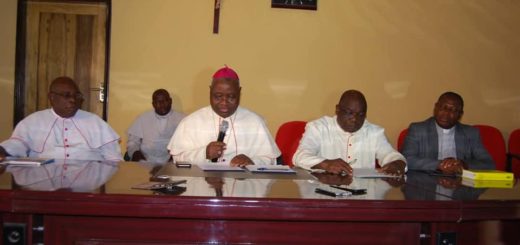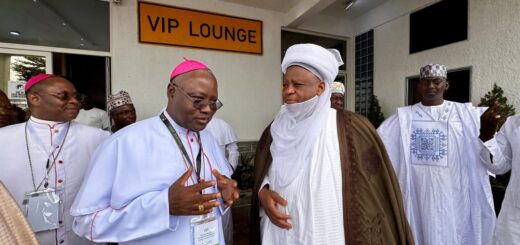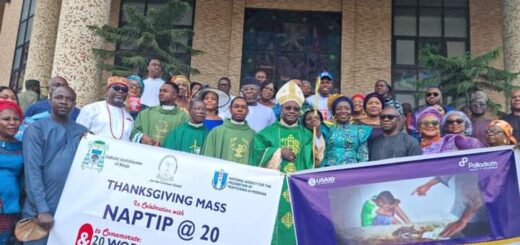Good Shepherd Sunday
by ARCH BISHOP · April 25, 2021
Fourth Sunday of Easter. Year B. Good Shepherd Sunday. Homily by Archbishop I. A. Kaigama at Holy Ghost Parish, Saburi. April 25, 2021
READINGS: Acts 4:8-12; 117(118): 1, 8-9, 21-23, 26, 28-29; 1 Jn. 3:1-2; Jn. 10:11-18
“Be shepherds of God’s flock that is under your care, watch over them…” (1 Pt. 5:2).
Greetings to you dear parishioners of Holy Ghost, Saburi, your parish priest, Fr. Nicholas Onyema, his assistant, Fr. Alex Osita Eze and the 320 candidates for the sacrament of confirmation.
The fourth Sunday of Easter is also known as Good Shepherd Sunday and the World Day of prayer for vocations, during which we reflect on the image of Jesus as the Good Shepherd, devotedly taking care of His flock.
In the New Testament, Jesus is described as the great shepherd of the sheep (cf. Mt. 16:18). His model of shepherding was servant-leadership. As the Lord and Master, He humbled Himself and became a servant (cf. Phil. 2:5ff). He served those whom He led (cf. Mk. 10:45). He was one with the people and shared in the very lives of those He came to seek and to save. He commanded Peter to “feed my lamb…, tend my sheep.” (Jn. 21:17).
Jesus, in our Gospel, describes the good shepherd as one who knows his sheep. This means that as a Shepherd, Jesus knows us personally and knows our names (cf. Jer. 1:5), feeding us, and offering us protection, shielding us from harm and leading us back to the fold when we stray. The Good Shepherd in Jn. 10:1-10, is set against the bad shepherds in Jeremiah 23 and Ezekiel 34, who instead of shepherding the flock, were feeding large on the sheep, allowing the sheep to stray or destroy valuable agricultural plants.
As the Good Shepherd, Jesus laid down His life for the sheep, so, in the Catholic Church, the Popes, Bishops and priests are expected to lead, nurture, comfort, correct and protect the flock.
Whether as a parent, a teacher, a manager, a Local Government chairman, a governor, a minister, a senator, a religious leader, a traditional ruler, etc., we are also shepherds who should provide for, suffer and even die for the sheep. African leaders prefer their followers to die for them (leaders); perhaps with the rare exception of Idriss Déby of Chad, who heroically died recently while leading his forces in battle.
What we experience today even in the Church is an increase in the number of self-acclaimed shepherds and the quest for materialism, popularity as miracle workers, without depth of faith. Success in ministry is measured in terms of material acquisition, the fleet of exotic cars, jets, luxurious travels and an ostentatious lifestyle, and not the salvation of souls. Some religious leaders make themselves the centre of attraction and rallying point, a kind of idolatry or personality cult.
Jesus’ example as a good shepherd teaches us religious and political leaders not to lord things over others or to sow seeds of discord or feed on the opportunities, potentials and resources meant to nurture and develop them.
In the Catholic Church the training of shepherds (priests) is taken very seriously, as being a religious leader is a calling, not a profession or a part-time enterprise.
The raging controversy about what a serving Minister preached or did not preach years ago only goes to show the sensitivity of religious matters in Nigeria which we must always approach with very great caution. It is a clarion call for the proper training of preachers. Mistaken or faulty positions held by preachers and communicated to followers can contribute to unnecessary tension and violence that could even lead to the waste of human lives. As a doctor must attain full professional knowledge before practising, so must preachers attain the height of religious formation before preaching, as ignorantia legit non excusat (ignorance of the law is not an excuse).
There is need for religious organizations to set the correct criteria for preachers, so that no one with the improper understanding of scripture or only with superficial and distorted truths of our faiths will cause religious friction and tension. We should preach the message of hope and salvation and not to incite followers to violence or to call others offensive names or to look condescendingly on adherents of other religions.
The Catholic programme for the training of priests takes up to nine to ten years, starting with the study of philosophy, to expose the students to the social sciences, critical, logical and metaphysical thinking, followed by the study of theology, comparative religions, and in Nigeria, with a compulsory study of Islam (some priests hold Masters or Doctorate degrees in Arabic and Islamic studies). Many priests also do post graduate studies in specialized fields. This is to strengthen their grip of the faith, to broaden their mental and social horizon so that they can preach and teach religion in a systematic way, while respecting the religious views of others.
A preacher in Nigeria must be knowledgeable in interreligious issues and have the capacity of an unbiased approach to religion without impatiently exhibiting unhealthy prejudices and hateful sentiments. A preacher must go through a long and effective training programme that should include the respectful study of other religions. One should not just start preaching because he is fluent, eloquent and can hold an audience captive. A preacher should be convinced of what he preaches, provided the message respects and fosters love, peace and promotes a common humanity.
Dear brothers and sisters, as we pray today for an increase of many more good priests, Rev. Sisters, catechists, volunteers, etc., let us remember as always, to pray for the Holy Father, Pope Francis, who reminds us that shepherds must smell like the sheep. We pray for Bishops all over the world in these trying times, as we also pray for political leaders. May we all listen at all times and in all things to the voice of the Shepherd par excellence, Jesus the Lord.




